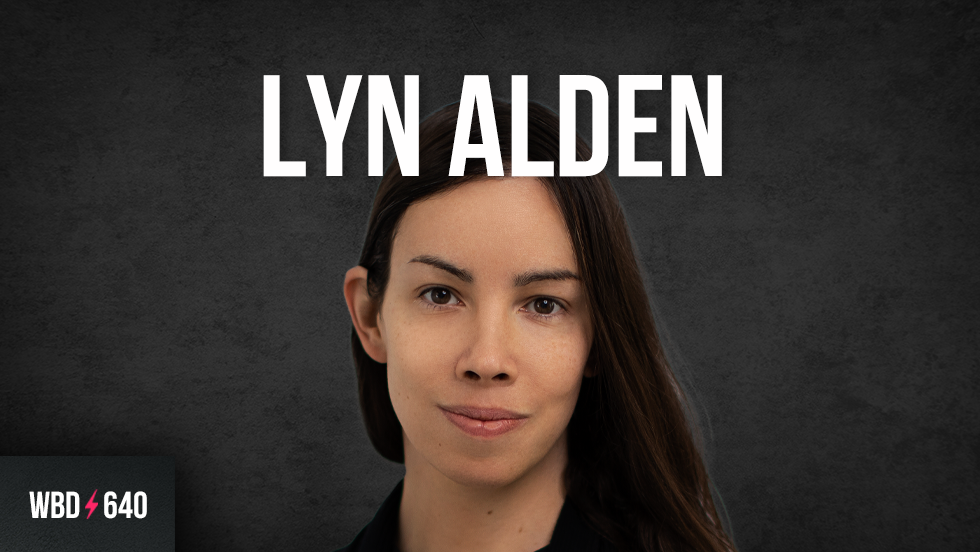The Global Financial Crisis 2? With Lyn Alden
Where to find the show
Download Episode MP3 File
The file will open in a new window. Click down arrow to download the file.
“The end game, that’s where it gets tricky, because there’s really no plan to ever stop the fiscal deficits. Debt to GDP is very, very high. And the world’s never been in this position before where we have an entirely Fiat-based system with debts this high. And especially because it’s not due to war. It’s due to accumulated promises over decades. So there’s no light switch, that can just change it next year.”
SHOW DESCRIPTION
Lyn Alden is a macroeconomist and investment strategist. In this interview, we discuss the recent run of bank failures: the causes, the impacts on the banking sector, federal support and exposure, and the likelihood of continued stress in the system. We also discuss a coming decade of recurring inflation and the emergence of reserve currency competition in a multi-polar world.
- - - -
“The vast majority of commercial banks that have ever operated in the U.S. have disappeared… the slow and steady decline in bank numbers continues.” This 2021 analysis by a St Louis Federal Reserve economist is as applicable now as then. Whilst the dramatic decline in bank numbers (from over 30,000 in 1921 to circa 4,000 now) mostly occurred in the 1930s, the past 3 decades have been characterized by a continued contraction that shows no sign of stopping.
There are obviously inherent risks in banking centralization. As we have seen in recent years, governments are delegating more regulatory authority to private banks, bypassing democratic norms in the process. As banks require central bank permission to operate, they have no incentive to resist such demands. Nevertheless, banking centralisation is a symptom of a more fundamental issue: a fiscal spiral that’s creating an increasingly volatile economic environment.
Unsustainable levels of debt are hampering central banks' ability to address growing inflation. Restraining economic growth decreases the ability of governments to reduce deficits. Further, the political cycle results in difficult but necessary policy decisions around fiscal constraints being deferred. The result is a yo-yo-ing of rate rises and bailouts. This increases the risk for all types of investment, even traditional safe havens. Banks struggle, and depositors run.
A situation that begins with investors seeking safer banks, if not resolved, can lead to investors seeking to divest themselves of sovereign currencies. This is where capital controls kick in. The fundamental issue is that governments will seek to protect the system, not the individual. The denial of licences for narrow banks is part of the same toolbox that includes gold seizures and potential restrictions on Bitcoin. Prepare accordingly.
TIMESTAMPS
00:01:49: Introductions
00:03:06: The liquidity problem with smaller banks
00:11:49: Banking regulations and full-reserve banks
00:17:08: Silicon Valley Bank
00:19:13: Narrow bank
00:25:41: Centralisation of banking
00:28:02: Shorting banks
00:29:54: Reserve ratios, and liquidity
00:41:05: A fiscal spiral, and a decade of inflation
00:48:00: Risk to dollar hegemony, and a multipolar world
00:52:50: Operation Choke Point
00:57:33: Rate changes, and being Jerome Powell
01:04:42: Final comments
SUPPORT THE SHOW
If you enjoy The What Bitcoin Did Podcast you can help support the show by doing the following:
Become a Patron and join our Discord to get access to shows early or help contribute
Make a tip:
Subscribe on iTunes | Spotify | Stitcher | SoundCloud | YouTube | TuneIn | RSS Feed
Leave a review on iTunes
Share the show and episodes with your friends and family
Subscribe to the newsletter on my website
Follow me on Twitter Personal | Twitter Podcast | Instagram | Medium | YouTube
If you are interested in sponsoring the show, you can read more about that here or please feel free to drop me an email to discuss options.
SPONSORS
SHOW NOTES
Connect with Lyn Alden:
On Twitter
On LinkedIn
Her Newsletter
Her Website
Mentioned in the interview:
Why did the $212bn tech-lender Silicon Valley bank abruptly collapse? - The Guardian, Mar 17th 2023
SVB collapse was driven by 'the first Twitter-fueled bank run' - CNN, Mar 14th 2023
Charles Schwab feels heat after SVB collapse - FT, Mar 14th 2023
Yellen seeks to calm lawmakers amid banking turmoil - Politico, Mar 16th 2023
HSBC acquires Silicon Valley Bank UK for 1 pound - Washington Post, Mar 13th 2023
Researchers: Uninsured Deposits Threaten Banking System - Investopedia, Mar 17th 2023
The Long Story of U.S. Debt, From 1790 to 2011, in 1 Little Chart - The Atlantic, Nov 2012
Explainer: Why is the Bank of England selling government bonds? - Reuters, Oct 2022
BRICS Debates Expansion as Iran, Saudi Arabia Seek Entry - Bloomberg, Feb 14th 2023
How China Overtook the U.S. as the World’s Major Trading Partner - Visual Capitalist, Jan 2020
How the Great Inflation of the 1970s Happened - Investopedia, May 2022
Cash Limits, CBDC And Bitcoin In Nigeria - Bitcoin Magazine, Feb 11th 2023
When Owning Gold Was Illegal in America - HuffPost, Jun 2016
Other Relevant WBD Podcasts:











